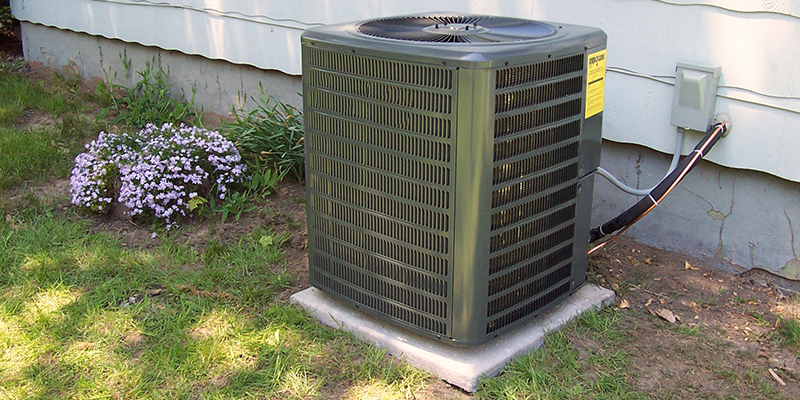Is it time to replace your AC unit? Find out the tonnage of your current system to give you a place to start while shopping for a replacement.
How to Find AC Tonnage
The easiest place to look is on the AC unit itself. Go outside to the condensing unit and look for a data plaque mounted to the side. Find the model number. Within this string of letters and numerals, you should find an even, two-digit number. The possibilities on residential units range from 18 to 60. Divide the number by 12 (which represents 12,000 Btu/hr, or one ton of cooling capacity) to get your AC unit’s tonnage. You can also view our chart below with the numbers and their corresponding tonnage.
- 18 = 1.5 tons
- 24 = 2 tons
- 30 = 2.5 tons
- 36 = 3 tons
- 42 = 3.5 tons
- 48 = 4 tons
- 60 = 5 tons
What is AC Tonnage?
Heating and air conditioning capacities are measured in British thermal units (Btu) per hour. One Btu is equivalent to the heat generated by a single birthday candle. It’s the amount of heat needed to raise the temperature of one pound of water by one degree.
The word “tonnage” is used to describe the cooling capacity of an air conditioner. One ton of cooling is the rate of heat transfer needed to freeze 2,000 lbs – or one ton – of water in 24 hours. This is equivalent to 12,000 Btu/hr.
Why is AC Tonnage Important?
In some cases, bigger is better. This is certainly true of meal sizes, lottery winnings, and discounts. But when it comes to air conditioners, sometimes less is more. You should never simply buy the biggest AC unit possible, or you could end up with an oversized system. Here are the problems associated with oversized air conditioners:
- Short cycling leads to increased wear and tear on the unit, resulting in more repairs and premature replacement.
- Short cycling prevents dehumidification, which leaves you with a cool but clammy interior. You may find yourself turning the temperature down to combat this, raising your electricity usageLink opens in a new tab in the process.
- Bigger air conditioners cost more to purchase and operate, a needless expense if your home is eligible for a smaller system.
Of course, an undersized unit is also problematic because it can’t keep up on the hottest summer days.
The Importance of Sizing a New Air Conditioner
You’ve found the tonnage of your AC unit – that’s great, but it doesn’t end there. Knowing your existing air conditioner’s tonnage doesn’t guarantee your new one should be the same size. After all:
- You might have made improvements since you installed your air conditioner to make your home tighter and more efficient.
- You could have added onto your home or finished the basement, increasing the total usable square footage.
- It’s possible the unit you have now was never sized properly in the first place.
Therefore, while finding the tonnage of your AC unit is a useful place to start, you should still have your replacement air conditioner professionally sized before making your purchase. You’ll maximize comfort and efficiency if you do.
Call Aire Serv® for Help Sizing Your Air Conditioner
Let Aire Serv® guide you through the AC-buying process. We will help you choose the proper size and select a high-quality brand with a cost-effective efficiency rating. Then, we will professionally install the unit to maximize performance. Get the most out of your upcoming investment – call Aire Serv today to get started.
